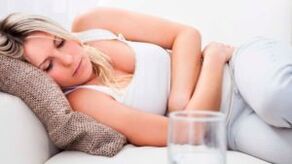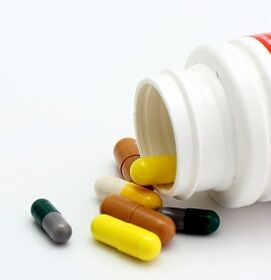
The urinary system is often exposed to infection.One of the most common infectious diseases of the urinary tract is cystitis.What to do with cystitis in women?Pathological treatment must begin at the first symptom.In the absence of therapy, the disease has a chronic form, which will be more difficult to deal with.
Cause factors and symptoms of disease
Cystitis is an inflammatory disease that develops in the bladder area.The disease is most often diagnosed in women, but cases of cystitis in men are not excluded.
The cause of the development of cystitis becomes a conventional pathogenic flora in the urinary tract of infection:
- Streptococci;
- Escherichia stick;
- Staphylococci;
- and others.
These infections may be due to non -compliance with the rules of the norms of hygiene to maintain the genitals or the results of the inflammatory process.Pathology is also sexually transmitted (ureaplasma or mycoplasma).
With cystitis, the patient has symptoms:
- pain in the urinary process;
- attacks suddenly -pain in the lower abdomen;
- Feelings of incomplete urination;
- urinary fluid incontinence;
- The color of the urine is muddy;
- The release of urine with blood;
- Temporary fever up to 38 degrees.
In women, the treatment of cystitis is performed on an outpatient by taking drugs.When performing therapy in the early stages, the disease can be eliminated without any complications.
Treatment of treatment tactics

The effectiveness of the therapeutic step depends on how early the diagnosis is performed.Determination of pathological causes (identification of the type of infection) also plays an important role.With the development of chronic or acute forms of cystitis, medications may have no effect, and infection will develop, causing kidney disease and genital organs.
The main task of the experts involved in patient therapy is to prevent the inflammatory process by destroying pathological microorganisms in the field of damage to the urinary mucosa.
The choice of medicine for cystitis is exclusively involved in a doctor taking into account the characteristics of the disease in women:
- type of infection;
- Stages of disease development;
- Characteristics of individual body (age, gender, weight);
- presence of contraindications;
- A tendency to indicate a bad reaction.
One important thing is to determine the reaction of pathological microorganisms to the composition of the drug.For this, a special study was conducted to help establish the most appropriate drug.
A competent approach to the treatment of cystitis
Drug therapy includes different group drug complexes.A woman is prescribed tablets from cystitis not only to destroy the infection, but also to prevent inflammation, as well as to reduce the intensity of the symptoms.
With complex therapy, medicines are recommended for groups:
- antibiotics;
- herbal preparations;
- antispasmodics;
- anti -inflammation;
- Probiotics.
For more effective treatment of cystitis in women, it is necessary, in addition to taking medications, to adhere to a special diet and observe the steps of hygiene.
Antibiotic
The main group of drugs that help prevent the development of infections with cystitis in women is antibacterial drugs.
Antibiotics have a strong effect on weight, so it is advisable to take it just as prescribed by the doctor.
Plant remedy
Phytopreparations have a lower effect of antibiotics, however, their toxic effects are less, so their use is allowed during pregnancy (with expert resolution).
In women, cystitis based on natural composition is used in combination with antibiotics.Therefore, treatment and recovery are faster.
Antispasmodics
With cystitis, patients are often worried about cramps in the urinary tract, especially during urination.To get rid of pain and cramps, a woman is recommended for drugs of cystitis with drotaverin content.
Taking Drotaverin -Contains medication is recommended for symptom therapy.Short -term acceptance is possible (2 - 3 days).
Anti -inflammation drugs
In addition to antibiotics, anti -medications that prevent the development of complications, especially with increased risk of kidney inflammation, can be prescribed to patients with cystitis.
Medicines of anti -anti -groups are often prescribed for one -time administration with increased symptom intensity (pain or temperature).
Probiotics
The use of antibiotics in most cases leads to violations of stomach function due to the effects of drugs on the walls of the gastrointestinal tract.To facilitate the operation of the digestive tract for the duration of the treatment, the co -operation of the probiotics is prescribed.
Taking probiotics reduce the risk of adverse reactions to drugs from the gastrointestinal tract.
Contraindications and side effects
Any medication for the treatment of cystitis in women should be selected taking into account the possible contraindications.In the therapy process, the patient can also manifest the symptoms of bad reactions, the cause of contraindications, exceeding the recommended dose or possible individual reactions to the drug.
Contraindications:
- Individual sensitivity to component components;
- some chronic diseases;
- the function of the kidney or liver affected;
- Problems of the central nervous system.
Most medications are not recommended to take during pregnancy or breastfeeding, as well as at the age of 18 or after 60 years.
Side reaction:
- Gastrointestinal tract disorders (diarrhea -constipation, nausea, abdominal pain);
- jumping in blood pressure, tachycardia and other disorders of the cardiovascular system;
- headache or dizziness attacks;
- state of depression, or mood change;
- allergic reactions to the skin;
- Change of urine color (bright yellow).
Taking drugs in the presence of contraindications can trigger the development or hunting of the disease.With a bad reaction, the patient can be prescribed symptom therapy.
Proper nutrition during treatment

To speed up the treatment of cystitis and prevent complications in conjunction with the use of drugs, it is necessary to observe a diet that restores mucous microflora and urinary function.
For recommended use:
- Most of the fruits, as well as the vegetables;
- Fruit drinks, green tea or free (sugar -free);
- Cover the grain.
Carrots, cabbages, pumpkin, asparagus, bran, and cedar nuts should be included in the diet.
With cystitis, the use of salts that have an annoying effect on the bladder wall should be excluded.
It is also not desirable to use:
- seasoning;
- canned food;
- smoked meat;
- sour;
- Sharp dishes.
The attending physician recommends the right diet or may be aimed at nutritionists.
Treatment with the medication of cystitis cannot begin without the initial consultation of a doctor who prescribes an individual treatment scheme for each woman.
























